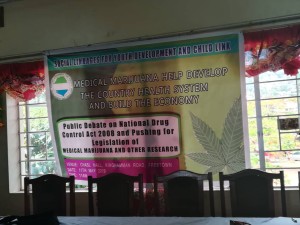With the entire liberal world in this century taking a refined view of drugs generally and the medicinal value, with the attention focused specifically on the production and manufacturing of medical marijuana, a youth activist group, Social Linkage for Youth Development and Child Link (SLYDCL) on May 11th, 2019 at the CCSL Hall, King Harman Road joined the crusade to raise awareness among the public and the government on the need to overhaul the country’s drug policy, hence the laws too.
In a broad context, the 1961 Single Convention on Narcotic Drugs, the international drug control regime, assumes that drugs can be utilized for “medical and scientific purposes the production, manufacture, export, import, distribution of, trade in, use and possession of drugs”.
With the interpretation left to the discretion of parties, the International Narcotics Control Board (INCB) offered some clarity in its 2003 report defined a medical substance as any preparation, synthetic or natural, used, designed or approved for the following purposes:
- Improving health and well-being;
- Preventing and treating disease – including the alleviation of symptoms of that disease;
- Acting

- Aiding conception or providing contraception;
- Providing general anesthesia.
As such, evidence abounds that marijuana has been used as a medicine for thousands of years to treat various illnesses. Its flowers are known to concentrate hundreds of different chemical compounds which produce pleasant reactions, feelings of relief and health improvements for patients suffering from a range of illnesses, when coming in contact with the endocannabinoid system in the human body.
In giving the considerations for legislative reforms to do with narcotic drugs, SLYDL forwards that in the countries that have yielded to the evidence provided that marijuana has efficacious medical uses; there is a wide range of mechanisms available to ensure access to medical marijuana. These include:
- Special individual licenses to import and use medicinal marijuana, while maintaining overall prohibitions over the plant, but establishing exceptions to the law to ensure patients’ access medicinal cannabis (e.g. Poland).
- Regulation of supply through the creation of a license system granted to individuals or private entities according to the type of activity they engage in (production, manufacture, export, processing, research, transport or sale), within which the state can play various roles – from central control to mere arbitration through regulatory bodies (e.g., Columbia and Peru).
- Regulation of demand with mechanisms allowing legal access to medications of herbal cannabis preparations through: self-cultivation, cannabis clubs, postal order, sale in clinics or sale in pharmacies (in Uruguay for recreational and by default medical use).
- The design and implementation of public policies that regulate access to certain products, in compliance with the regulatory system in place for medicines (e.g., Germany).
As such SLYDCL recommends that government in the light of the overwhelming evidence that use of marijuana has no significant harmful effect on its users and society outlines the following police recommendations for the attention and consideration of the government:
- Legalise cannabis for medicinal use, as well as medications and therapeutic substances derived from it, for all aliments identified by scientific research, and not only limiting access for a few arbitrarily determined illnesses.
- Immediately include medications derived from cannabis in the basic range of medicines – that is, without the need for judicial actions requiring the state to do so, and avoiding also the high costs that individual importation of such medication would involve for each specific case.
- Reform the necessary laws to create and allocate budget to ensure the constant generation of scientific research.
- Coordinate all relevant agencies to streamline the various technical and sanitary processes that allow new medications to reach the market quickly, while always ensuring the highest possible standards for consumer health protection.
- Establish the mechanisms necessary to avoid the creation of monopolies or a restriction of the market to a few specific groups who would hold all patents and sale licenses to the detriment of the health and economic welfare of the general population.
- Implement public education and awareness raising campaigns for the general public and patients on medical marijuana.
- Every legislative measure should include domestic regulations for production, rather than be limited to the importation of products. The resulting regulatory regimes should also consider all measures necessary to promote the integration of existing small-scale growers, and insofar as possible, do so under conditions equal or favorable to those granted to new permit holders and/or capital intensive foreign industry.
- Small scale farmers involved in cannabis for subsistence purposes should be involved in decision making processes to enable the incorporation of their needs, and should receive technical assistance so they can participate in the business of medical cannabis.




